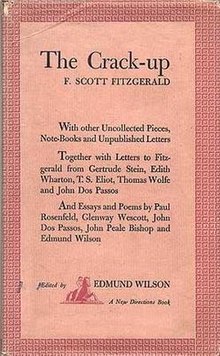Fitzgerald and “Second Acts”
At lunch today, a friend and I invoked the line “There are no second acts in American life,” and then weren’t sure where it came from. We thought it was F. Scott Fitzgerald, but how, and what did he mean?
So this afternoon I looked it up. The line did come from Fitzgerald. But the source and meaning are debatable.
Around 1935 Fitzgerald wrote an autobiographical essay called “My Lost City” that said: “I once thought there were no second acts in American lives, but there was certainly to be a second act to New York’s boom days.” In 1945 that text was published in the posthumous collection The Crack-Up.
In addition, the notes that Edmund Wilson published with The Last Tycoon after he reconstructed Fitzgerald’s unfinished manuscript included this line: “There are no second acts in American life.” It’s not clear to me how closely that scrap was connected to that novel, but Wilson thought it was.
The line as published with The Last Tycoon has become famous. But the line in “My Lost City” suggests Fitzgerald was reconsidering that observation, or at least didn’t think it applied everywhere.
Furthermore, we’ve attached a different significance to the line. We tend to interpret the “second act” as meaning a comeback, a second chance, or more of someone’s story.
However, in “My Lost City” the “second act” that Fitzgerald described was the early years of the Great Depression when New Yorkers were feeling the effects of the stock market crash. People he had just described as being worth millions in stock were back at their laboring jobs.
As Fitzgerald used the phrase, there was a “second act” in American life, even if it tended to catch Americans by surprise. And that second act was a reckoning, not an encore.
So this afternoon I looked it up. The line did come from Fitzgerald. But the source and meaning are debatable.
Around 1935 Fitzgerald wrote an autobiographical essay called “My Lost City” that said: “I once thought there were no second acts in American lives, but there was certainly to be a second act to New York’s boom days.” In 1945 that text was published in the posthumous collection The Crack-Up.
In addition, the notes that Edmund Wilson published with The Last Tycoon after he reconstructed Fitzgerald’s unfinished manuscript included this line: “There are no second acts in American life.” It’s not clear to me how closely that scrap was connected to that novel, but Wilson thought it was.
The line as published with The Last Tycoon has become famous. But the line in “My Lost City” suggests Fitzgerald was reconsidering that observation, or at least didn’t think it applied everywhere.
Furthermore, we’ve attached a different significance to the line. We tend to interpret the “second act” as meaning a comeback, a second chance, or more of someone’s story.
However, in “My Lost City” the “second act” that Fitzgerald described was the early years of the Great Depression when New Yorkers were feeling the effects of the stock market crash. People he had just described as being worth millions in stock were back at their laboring jobs.
Full of vaunting pride the New Yorker had climbed here and seen with dismay what he had never suspected, that the city was not the endless succession of canyons that he had supposed but that it had limits—from the tallest structure he saw for the first time that it faded out into the country on all sides, into an expanse of green and blue that alone was limitless. And with the awful realization that New York was a city after all and not a universe, the whole shining edifice that he had reared in his imagination came crashing to the ground.Fitzgerald himself was struggling in these years, no longer the golden boy of American fiction and beset by personal problems.
As Fitzgerald used the phrase, there was a “second act” in American life, even if it tended to catch Americans by surprise. And that second act was a reckoning, not an encore.



1 comment:
Well, this makes the mind reel!
Post a Comment